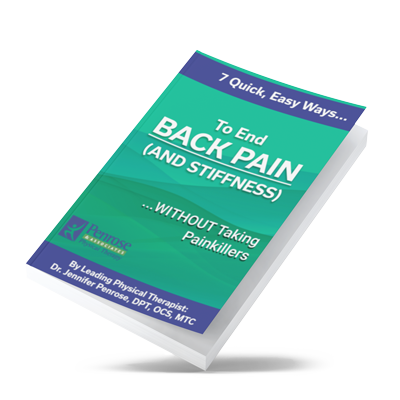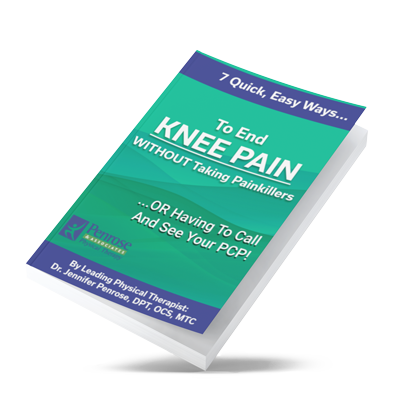LACEY (WA) – We have covered a lot of topics related to knee pain so far so let’s do a quick review. We have discussed the three things that could be making your knee pain worse such as; wearing the wrong type of shoes, sitting with your legs bent, and not working hard enough. We have also talked about how painkillers, rest, and wearing a knee brace are three common “quick-fixes” people hope will help their knee pain. We’ve also looked at if/how knee replacement surgery can be avoided. And lastly, we recently reviewed how to stop arthritis before it stops you!
That’s a lot to cover in just 4 weeks, but we’ve still got more to cover! Knee pain is something that a lot of people struggle with during any time of the year, but especially during the winter/early spring months when people are still inclined to stay indoors due to poor weather conditions.
Now, here’s a recent question that was sent to me by someone with knee pain: “Jennifer, I’ve been suffering with on-off type knee pain for more than a year. What I can’t put my finger on is when it started or why, and what’s more confusing is that my pain gets worse as the day goes on. But whenever I wake up, the pain is gone – or is considerably less. Yet by the end of another day, my knee aches, sometimes it feels hot and swollen and I’m often in considerable pain – especially if I’ve been out for a long walk with my dog. Any ideas?” – Beth, 58, Lacey.
What’s happening here is likely to be a simple case of the muscles around Beth’s knee joint being “weak”. As in, the muscles just aren’t strong enough to last through the day or cope with her desired daily activities. Think of it like this: when you lay down and are feeling ready to get some sleep, it’s usually because your body is tired from all of the energy you’ve used throughout the day. Well, your muscles need rest too as they’ve been working throughout the entire day as well.
As you may be able to guess, as you sleep, not only does your body rest but your muscles do as well. The nightly rest allows your muscles to feel less achy when you wake up due to being reenergized for a new day. However, if there is a muscle with any damage or increased weakness to it, the nightly rest likely isn’t going to completely “reenergize” the muscle for an entire upcoming day.
And so, usually around dinner time, after a lot of “being on your feet”, your muscles will be fairly fatigued and start to “pack-up” for the day. And when they do this, joints, such as your knees, are left to do all the work for the rest of the day, and that’s not good! Particularly if you’re aged 45+, as that’s the period where cartilage damage really begins (arthritis) and the surfaces of your knee start to rub together.
And without muscles to support your knee joints, or just really tired and weak ones, you’re much more likely to suffer aches and pains. The same thing can also often occurs with neck and shoulder muscles at night. It’s also the reason why when you have the “flu” or a common cold, you always feel worse at night. If you have children, have you ever noticed they get more irritable as the night draws in if they have a virus?
It’s the same thing going on, your body will put up a better fight after a good night’s sleep, as it begins to get tired again through the day.
So the answer to Beth’s knee problem? Well, it’s likely to be a simple case of strengthening the knee muscles (hip and lower back ones too) to make them stronger. But here’s something people often get wrong, activities such as walking your dog everyday will do very little to strengthen muscles. It actually may make things worse, especially if you have weak muscles. You’ll likely only begin to cause more pain, not less. So, contrary to some popular beliefs, more exercise is not always the answer. Rather, doing the correct exercises to target weak muscle groups is far more beneficial to help alleviate that annoying knee pain!
The author, Jennifer Penrose, is a Physical Therapist and owner of Penrose Physical Therapy. If you have any questions about knee pain, you can call (360) 456-1444 or email info@penrosept.com






